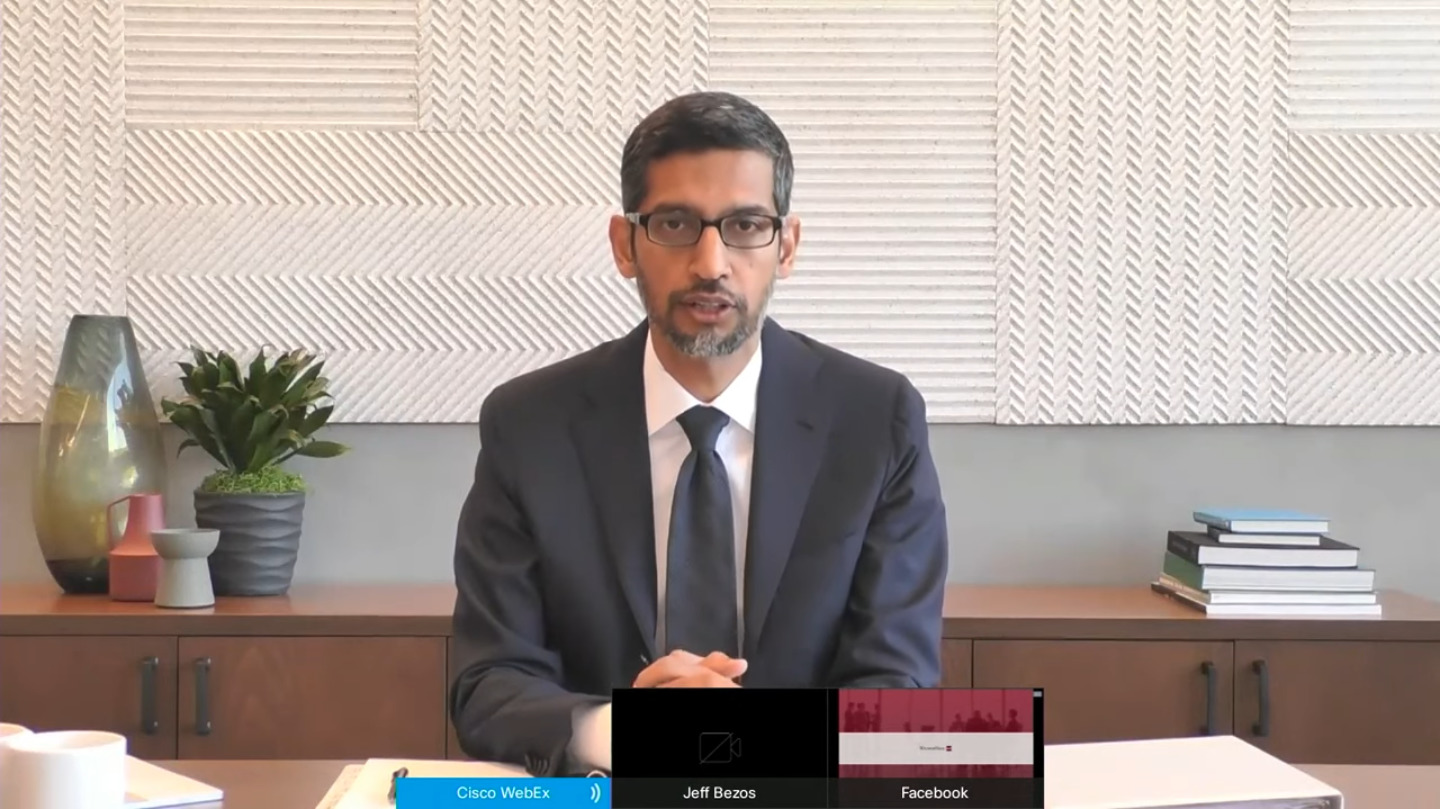DOJ Antitrust Suit: Sundar Pichai's Warning On Google Search's Survival

Table of Contents
The Core Arguments of the DOJ Antitrust Suit Against Google
The DOJ's antitrust lawsuit against Google centers on accusations of monopolistic practices and anti-competitive behavior that harm consumers and stifle innovation within the search engine market. The core arguments revolve around Google's alleged abuse of its dominant position to maintain its market share and suppress competition.
-
Antitrust Violations: The DOJ alleges Google has violated antitrust laws by engaging in a pattern of conduct designed to maintain its monopoly. This includes leveraging its dominant position in search to favor its own products and services.
-
Monopolistic Practices: The suit details how Google allegedly uses exclusive agreements with device manufacturers and mobile carriers to pre-install Google Search and Chrome, making it the default search engine for billions of users. This effectively locks out competitors and prevents them from gaining a foothold in the market.
-
Search Bias and Market Manipulation: The DOJ argues Google manipulates its search algorithm to prioritize its own products and services, like Google Shopping and Google Maps, over those of competitors. This practice, they claim, unfairly disadvantages rivals and distorts search results, harming consumers.
-
Competitive Harm: The lawsuit highlights the impact of Google's actions on smaller search engine competitors, arguing that Google's monopolistic practices have significantly limited their ability to compete fairly and innovatively. This lack of competition, the DOJ contends, ultimately harms consumers who benefit from a diverse and competitive marketplace.
Sundar Pichai's Testimony and Defense Strategy
Sundar Pichai's testimony before the court provided a crucial window into Google's defense strategy against the DOJ's allegations. While acknowledging Google's significant market share, Pichai largely defended the company's practices.
-
Key Arguments: Pichai argued that Google's success stems from providing high-quality search results and constant innovation. He emphasized the value Google Search provides to users and countered claims of deliberate manipulation, attributing the ranking of results to a complex, constantly evolving algorithm.
-
Defense Strategy: Google's defense hinges on demonstrating the benefits of its search algorithm and its commitment to innovation. They argue that their actions are driven by user needs and aimed at improving the user experience, not at stifling competition. Their legal team points to the presence of alternative search engines and the constant evolution of the market as evidence against claims of complete market dominance.
-
Effectiveness of the Defense: The effectiveness of Google's defense remains to be seen. While the arguments presented by Pichai highlight Google's perspective, the ultimate determination rests with the court. The DOJ's evidence and legal arguments will be crucial in determining the outcome.
Potential Outcomes and Implications for Google Search
The DOJ antitrust suit against Google has several potential outcomes, each with significant implications for Google Search and the broader digital market.
-
Antitrust Ruling: The court could rule in favor of the DOJ, finding Google guilty of antitrust violations. This could lead to significant penalties and structural changes within Google's business model.
-
Potential Penalties: Penalties could include substantial fines, mandated changes to Google’s business practices, and even the forced divestiture of certain assets.
-
Market Impact: A ruling against Google could significantly impact its market share, potentially opening the door for alternative search engines to gain traction. This could lead to a more diversified and competitive search engine market.
-
Search Engine Alternatives: A less dominant Google could pave the way for the rise of competitors like DuckDuckGo, Bing, or even new entrants. This increased competition could benefit consumers through increased innovation and choice.
-
Impact on Users and Consumer Choice: The ultimate impact on users depends on the specifics of any ruling. Increased competition might lead to more diverse features and better privacy protections for users.
The Broader Implications for the Digital Market
The DOJ antitrust suit extends beyond Google; it has profound implications for the entire digital market.
-
Digital Market Competition: The case raises fundamental questions about the role of dominant tech companies and the need for robust regulatory oversight to ensure fair competition and prevent monopolistic practices.
-
Innovation: A more competitive market could stimulate innovation by encouraging smaller companies to develop and offer alternative products and services. Increased competition can often lead to quicker innovation cycles.
-
Regulatory Oversight: The outcome of this lawsuit will heavily influence future regulatory approaches to tech monopolies and the need for stronger antitrust enforcement. This could lead to significant changes in how tech giants operate.
-
Consumer Protection: The case underscores the importance of consumer protection and user choice in the digital marketplace. Increased competition could benefit consumers by offering more options and potentially fairer prices.
Conclusion
The DOJ antitrust suit against Google, highlighted by Sundar Pichai's warnings, represents a turning point for the future of online search. The potential penalties and shifts in market dynamics could dramatically reshape the digital landscape. The outcome will have profound consequences for Google Search, impacting its dominance, business model, and the choices available to consumers. This case emphasizes the critical role of competition in fostering innovation and protecting consumers.
Call to Action: Stay informed about the developments in the DOJ antitrust suit against Google. Understanding the implications of this landmark case is crucial for anyone concerned about the future of Google Search and the broader digital market. Follow reputable news sources for continuous updates on this significant legal battle affecting the very core of online search.

Featured Posts
-
 Mwed Itlaq Blay Styshn 6 Twqeat Wtsrybat
May 02, 2025
Mwed Itlaq Blay Styshn 6 Twqeat Wtsrybat
May 02, 2025 -
 125 Murid Asnaf Sibu Terima Bantuan Kembali Ke Sekolah Dari Tabung Baitulmal Sarawak 2025
May 02, 2025
125 Murid Asnaf Sibu Terima Bantuan Kembali Ke Sekolah Dari Tabung Baitulmal Sarawak 2025
May 02, 2025 -
 Voyage A Velo Le Periple De 8000 Km De Trois Jeunes Ornais
May 02, 2025
Voyage A Velo Le Periple De 8000 Km De Trois Jeunes Ornais
May 02, 2025 -
 Lawless Update Checking Fortnite Server Status During Chapter 6 Season 2 Maintenance
May 02, 2025
Lawless Update Checking Fortnite Server Status During Chapter 6 Season 2 Maintenance
May 02, 2025 -
 Is This Christina Aguilera Fans React To Edited Photoshoot Images
May 02, 2025
Is This Christina Aguilera Fans React To Edited Photoshoot Images
May 02, 2025
Latest Posts
-
 The Aoc Pirro Feud Separating Fact From Fiction
May 10, 2025
The Aoc Pirro Feud Separating Fact From Fiction
May 10, 2025 -
 Fiery Exchange Tarlov Rebukes Pirro On Trade War With Canada
May 10, 2025
Fiery Exchange Tarlov Rebukes Pirro On Trade War With Canada
May 10, 2025 -
 Aocs Point By Point Rebuttal Of Jeanine Pirros Fox News Statements
May 10, 2025
Aocs Point By Point Rebuttal Of Jeanine Pirros Fox News Statements
May 10, 2025 -
 El Salvador Prison Transfers Jeanine Pirros Controversial Remarks On Due Process
May 10, 2025
El Salvador Prison Transfers Jeanine Pirros Controversial Remarks On Due Process
May 10, 2025 -
 Jeanine Pirros Dc Attorney Nomination The Controversy Surrounding A Past Incident
May 10, 2025
Jeanine Pirros Dc Attorney Nomination The Controversy Surrounding A Past Incident
May 10, 2025
